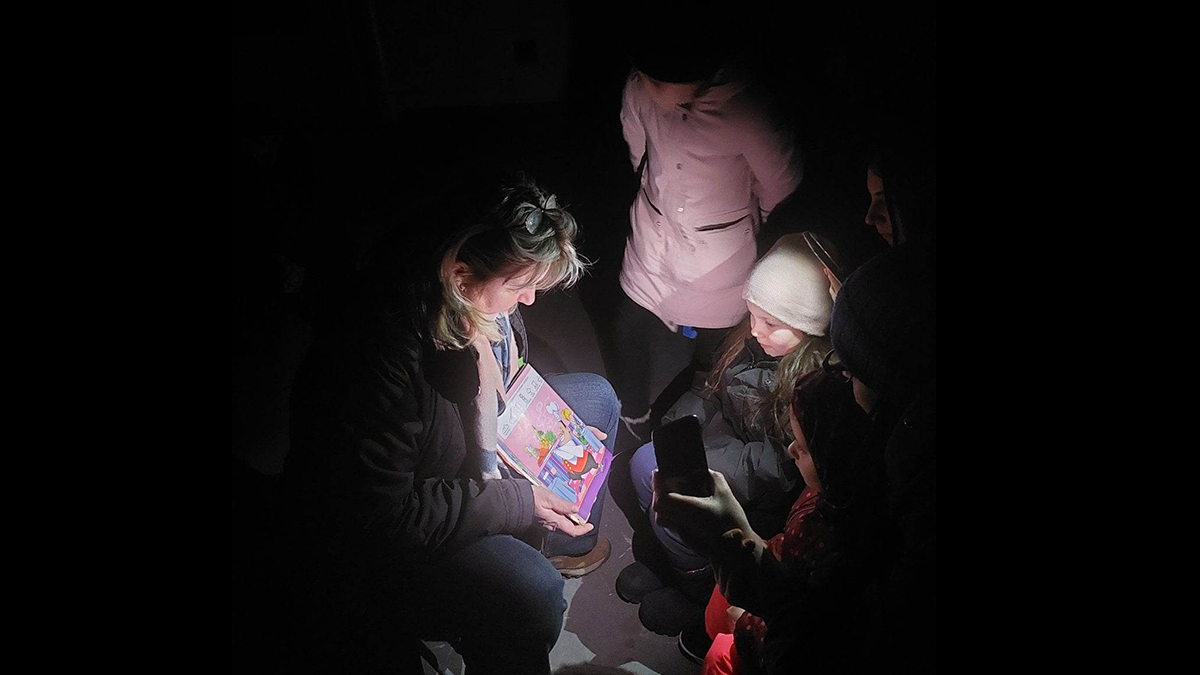Today, as we mark one full year of war in Ukraine, we step beyond our coverage of presidents, soldiers, diplomats, and weapons to speak with a person working inside the conflict to build a better future in the most direct way possible.
Marina Kudriavtseva is a teacher of small children. She lives and works in Kyiv. (Her responses have been translated from Ukrainian.)
Marina, tell us about your work.
I’ve been a teacher for 12 years. For the past two years, I’ve taught children aged 5-8 at an after-school education institution called the Kyiv State House of Artistic and Technical Creativity. I teach a total of 28 children in small groups of up to six. We call the groups “circles” rather than “classes.”
My program is aimed at the development of attention, memory, logical thinking, imagination, the ability to analyze, speech development, and creativity. They also learn socialization, safety strategies, and etiquette.
I call this two-year program "Me and the world around me."
What happens in the school when an air raid siren goes off?
The siren can be heard all over Kyiv and on applications installed on mobile phones. [Here is the sound of the alarm.] When an air alert is announced, there is an automatic announcement on the phone.
I then inform the children that we must all go to the shelter. Everyone must put on their coats, hats, and shoes because we have to go outside to reach the shelter nearby. I take what I can – a game or a book – so we can continue our work. I also take an "anxiety suitcase" that contains antiseptic, napkins, garbage bags, a first aid kit, a blanket, a flashlight, candles, and a lighter.
We leave together and go to the shelter. We settle down there and continue our classes. We talk, we play, and we wait for the sound of the air alarm that tells us it’s safe to return to our classroom.
How do the children respond to the alarms?
The children react differently to the siren. Some are more or less calm. Some get scared and begin to cry. Sometimes there are children who panic. Some children know the procedure so well that we have to stop them because they move too quickly. We must all leave the class together.
Someone needs help, another just needs to be reassured, because I see they are worried. Some become very angry. I am sure the support of teachers is very important to them. We try to do everything we can so that they always feel this support. They are courageous.
What is it like to teach during wartime?
At any moment, you must be ready to interrupt a lesson when the children may be doing something with enthusiasm – listening, searching for something, making something with plasticine clay or paper, solving an interesting problem. Suddenly there is anxiety. You drop everything, get dressed, and go to the shelter. You must always have a "plan B" in your head. "What will I do with the children if we must go the shelter?"
Shelters are not equipped for training. We do what we can. I downloaded some tasks to my phone. Someone uses a tablet. Those who need musical accompaniment bring Bluetooth speakers with them ... We use everything we can quickly carry.
Now … imagine this happens several times a day. Now add a power outage. The lights all go out. Flashlights must be ready. And we continue. Teachers and all who work in education know this is our duty. We hold the “educational front!" I hope you can translate this saying correctly. [In Ukrainian, the phrase is "Тримаємо освітній фронт.”]
The parents trust us. They understand the requirements that exist now. Almost every child has a small backpack filled by their parents as their own kind of “anxiety suitcase” when it is necessary to stay in the shelter.
What else would you like people outside Ukraine to know about the children and their lives?
I would really like everyone who is safe outside of Ukraine, who is not threatened by war every day, every minute, to understand what happiness it is to live in peace. I would really like them to know how strong and courageous our children are, who, unfortunately, are forced to grow up much earlier than children in other countries. These are children who at the age of 5 already know what danger is.
I want them to know that our children cannot live the full and carefree life they should have. That many children of Ukraine will never see their parents again. They will never return to their homes. The word "war" will be remembered forever. And many more terrible things that no normal person would wish on anyone.
But I also want them to know that our children will grow up strong. And all of us adults who are with them will continue to do everything we can to keep them together. They have studied. They have had fun and laughed, even in bomb shelters. They have received gifts and participated in contests. They have won. Their talents are growing and blossoming as they grow. We want them to be confident and to know that we will overcome all difficulties and win.
